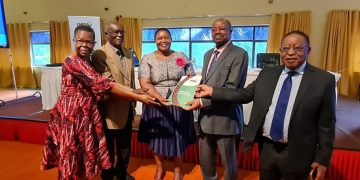Government and coffee stakeholders have committed to add value to Uganda’s coffee so that Ugandans earn more money from the country’s leading cash crop.
Officiating the closure of a three-day Validation Workshop on National Dialogue on developing the coffee value chain at Speke Resort Munyonyo, The Minister for Presidency, Milly Babirye Babalanda, noted that although Uganda is Africa’s leading coffee exporter and 3rd best globally in producing quality coffee, the economic dividends of coffee to Ugandans have been suppressed for long due to limited investment in value addition, weak domestic consumption and policy discords.
“Government should take action to strengthen the coffee sector to enhance its contribution towards social-economic transformation of Uganda,” Babalanda said.
The Workshop was a follow-up on the National Coffee Dialogue held last month at Lake Victoria Serena Hotel, where a number of resolutions were made.
It was organized by the Office of the President in conjunction with Operation Wealth Creation (OWC) and Uganda Coffee Development Authority (UCDA).
Babalanda noted that the recent coffee dialogues are a result of President Yoweri Museveni’s document dated 2nd October 2022, entitled “Organizing Uganda’s Coffee Value Chain”, where the President raised fundamental questions regarding coffee value addition, especially on establishment of industrial production of coffee products in Uganda and the resultant social, economic and policy implications.
She noted that Uganda has primarily remained a major exporter of green coffee beans as a raw material to industries in Europe.
Adding, “Uganda can only celebrate being Africa’s leading exporter of coffee while remaining a donor of jobs to industrialized consumer countries. The government has prioritized the need to attract investment in industrial processing of coffee, and this has generated positive debate in the past few months.”
At the same event, the Minister formally received the resolutions of the coffee stakeholders on value addition and other emerging issues from former Finance Minister, Gerald Ssendaula, former Minister of Agriculture, Victoria Ssekitoleko and Prof. Ezra Suruma
Resolutions
Speaking to the media, Gerald Ssendaula, the Chairperson of the National Union of Coffee Agribusinesses Farm Enterprises (NUCAFE), a coffee farmers’ national organisation, said coffee remains the most important crop for Uganda’s economy since it has been generating the much needed foreign exchange for the country for many decades.
He noted that for the coffee sub-sector to remain relevant, the coffee stakeholders have unanimously resolved that the Government rescinds its earlier decision to merge UCDA with the Ministry of Agriculture, Animal Industry and Fisheries (MAAIF).
Sendaula said Uganda’s coffee sub-sector has made a lot of progress since the creation of UCDA in 1991, noting that despite the devastating Coffee Wilt Disease, the country now produces over eight million bags and exports over six million bags of coffee, up from about two million bags about 10 years ago.
“The idea of taking UCDA to MAAIF isn’t just resented by people but we feel we need to make some input and Government has accepted that we can get together and exchange views. Are there sound reasons why the proposal to put UCDA in Ministry of Agriculture is not viable for the crop? It’s not proper (to merge UCDA with MAAIF) at this time. You need a lot of speed and care; you have to appreciate that coffee is food, so you need that speed of a commercial nature rather than the speed which is of a Civil Service kind of approach,” he noted.
He added that if Uganda is to remain competitive in the global coffee arena, UCDA should be retained as an autonomous body to handle and coordinate all coffee-related activities.
Former Minister of Agriculture, Victoria Ssekitoleko, said that coffee deserves special attention because it remains the largest foreign exchange earner for Uganda and the largest employer in Agriculture.
“If we are to create jobs, that’s the fastest way you can create jobs. What we are looking at now is intensifying everything in the coffee value chain-starting from research, seedlings, production, agronomy, processing, traders, all the way to the cup either in Uganda or abroad. We are looking at strengthening and maintaining the coffee sector in such a way that it keeps leading but with full support,” Ssekitoleko said.
On value addition, Ssekitoleko said value addition starts from the farmer because quality is key.
Also present was Amos Lugoloobi, the State Minister of Finance and Planning who attended on behalf of the Ministry of Finance, Planning and Economic Development.









